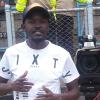Police boots symbolizing a dead police officer rest atop a coffin during a funeral Mass in the parish hall of St. Francis Xavier Church in Owo, Nigeria, June 17, 2022. The Mass was for at least 50 victims killed in a June 5 attack by gunmen during Mass at the church. (CNS /Reuters/Temilade Adelaja)
As Nigerians head to the polls for presidential elections on Feb. 25, Catholic bishops and priests in the West African nation are expressing hope a new leader might address a spate of violent attacks against Christians in the country.
The vote will usher in a new administration to replace the government of Muhammadu Buhari, who is term-limited after serving as president since 2015. Buhari's two terms have been marred by insecurity and deadly attacks on Christians, including Catholic priests and bishops.
Bola Tinubu, the 70-year-old former governor of Lagos, the capital, represents the ruling All Progressives Congress party. The 76-year-old former vice president, Atiku Abubakar, leads the main opposition People's Democratic Party.
With many frustrated with the status quo in Nigeria, a third option has emerged: Peter Obi, 61, a former banker who has campaigned to improve the naira currency and wean the Nigerian economy of its dependence on oil production.
While Nigerian Catholic Church leaders have been careful not to endorse a specific candidate, they have been playing a key role in campaigning and calling for peace. Nigeria is prone to violence during election periods and is sharply divided along religious lines.
Muslims are dominant, with over half the 200 million populace, followed by Christians, who constitute about 45% of the population. About 10% of the population are Catholic.
"The Catholic Church in Nigeria has played a vanguard role in terms of peace building and social cohesion," Fr. Uchechukwu Obodoechina, executive director of Caritas Nigeria, told NCR. "The church leadership and followers are involved in mass mobilization and teaching of peace and coexistence irrespective of political affiliation."
Early in February, the Nigerian bishops voiced concern about the poor state of security in Nigeria and spoke out against "the incessant abductions, killings and kidnapping of Catholic priests and nuns" in the country. A new report says 145 Catholic clergy were attacked in 2022, with 39 priests killed by gunmen and 30 others abducted.
Obodoechina told NCR that although insecurity and attacks on Christians — including the brutal killing of at least 40 parishioners during a Catholic Mass in June 2022 — are top worries, the Nigerian crisis is multifaceted.
Poverty and poor economic performance, as well as natural disasters such as flooding, have been key crisis points for Nigerians in the past few years, drawing Catholic charities to chip in with humanitarian assistance.
"The situation in Nigeria is much more complex, hence these elections and their outcome are important. The Nigerian crisis is about poverty, it is about insecurity, it is about a toxic environment and decadence in governance. The Nigerian crisis is equally about a state of lawlessness and impunity," Obodoechina said.
New voters wait during the Independent National Electoral Commission voter registration in Abuja, Nigeria, June 23, 2022. Frustrations with the government and conditions in the country have spurred an increase in voter registration. (CNS/Reuters/Afolabi Sotunde)
Fr. Ugochukwu Ugwoke of the Schoenstatt Fathers Community in Ibadan city criticized the current government's handling of the country's many crises.
"Nigerians should leverage on the experience of the past eight years and it is my conviction that Nigerians will be able to elect a leader who will bring hope to our despairing country," Ugwoke said in an interview.
The crisis dogging Nigeria has spurred increased voter registration. About 93.4 million Nigerians have registered to vote, with more than half below age 34, data from the country's electoral body show.
Cardinal Peter Ebere, who leads the Ekwulobia Diocese, pointed to those figures in his 2023 Lenten message.
"It seems that people woke up to the reality that decisions by those entrusted with political positions have a ripple effect for good or ill. The worsening socio-economic and cultural situation contributed to this mass mobilization," Ebere said in the message.
Nigeria's economy, worsened by high inflation that currently stands at 21.8% – the highest level since September 2005 — is also battling a weak currency. Lately, the country has experienced a shortage of naira currency notes, with Nigerians unable to access notes for transactions from their banks.
This was after the government, which intended to introduce new monetary notes, withdrew the old notes from circulation to contain monetary supply in hopes of stifling inflation. The government has since allowed the old notes back into circulation for two more months.
Advertisement
"Nigeria's political backdrop remains tense amid the ongoing scarcity of cash caused by the central bank's push for new Naira notes," said Ikenga Kalu, currency trader with AZA Finance, in a weekly email analyzing continental developments.
Pieter Scribante, political economist and country analyst for Nigeria at Oxford Economics Africa, told NCR that economic issues appear "top of mind" for Nigerian voters.
The currency crisis "is definitely influencing voters" across the country, he said.
But Catholic bishops and priests in Nigeria say they are not losing hope for a better Nigeria after the elections.
Caritas Nigeria says it will deploy some 6,000 observers at polling places to ensure the election process is credible. Said Obodoechina: "We never lost hope of a better future and a better Nigeria. 2023 is the time for Nigeria to rise from the dungeons of corruption. After all this darkness will come enormous light."







